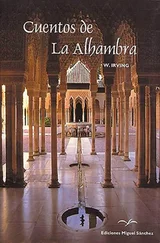Still, the dismal howlings and ejaculations I had heard were not ideal; they were soon accounted for, however, by my handmaid Dolores: being the ravings of a poor maniac, a brother of her aunt, who was subject to violent paroxysms, during which he was confined in a vaulted room beneath the Hall of Ambassadors.
In the course of a few evenings a thorough change took place in the scene and its associations. The moon, which when I took possession of my new apartments was invisible, gradually gained each evening upon the darkness of the night, and at length rolled in full splendor above the towers, pouring a flood of tempered light into every court and hall. The garden beneath my window, before wrapped in gloom, was gently lighted up, the orange and citron trees were tipped with silver; the fountain sparkled in the moonbeams, and even the blush of the rose was faintly visible.
I now felt the poetic merit of the Arabic inscription on the walls: “How beauteous is this garden, where the flowers of the earth vie with the stars of the heaven! What can compare with the vase of yon alabaster fountain filled with crystal water? Nothing but the moon in her fulness, shining in the midst of an unclouded sky!”
On such heavenly nights I would sit for hours at my window inhaling the sweetness of the garden, and musing on the checkered fortunes of those whose history was dimly shadowed out in the elegant memorials around. Sometimes, when all was quiet, and the clock from the distant cathedral of Granada struck the midnight hour, I have sallied out on another tour and wandered over the whole building; but how different from my first tour! No longer dark and mysterious; no longer peopled with shadowy foes; no longer recalling scenes of violence and murder; all was open, spacious, beautiful; every thing called up pleasing and romantic fancies; Lindaraxa once more walked in her garden; the gay chivalry of Moslem Granada once more glittered about the Court of Lions! Who can do justice to a moonlight night in such a climate and such a place? The temperature of a summer midnight in Andalusia is perfectly ethereal. We seem lifted up into a purer atmosphere; we feel a serenity of soul, a buoyancy of spirits, an elasticity of frame, which render mere existence happiness. But when moonlight is added to all this, the effect is like enchantment. Under its plastic sway the Alhambra seems to regain its pristine glories. Every rent and chasm of time; every mouldering tint and weather-stain is gone; the marble resumes its original whiteness; the long colonnades brighten in the moonbeams; the halls are illuminated with a softened radiance — we tread the enchanted palace of an Arabian tale!
What a delight, at such a time, to ascend to the little airy pavilion of the queen’s toilet (el tocador de la Reyna), which, like a bird-cage, overhangs the valley of the Darro, and gaze from its light arcades upon the moonlight prospect! To the right, the swelling mountains of the Sierra Nevada, robbed of their ruggedness and softened into a fairy land, with their snowy summits gleaming like silver clouds against the deep blue sky. And then to lean over the parapet of the Tocador and gaze down upon Granada and the Albaycin spread out like a map below; all buried in deep repose; the white palaces and convents sleeping in the moonshine, and beyond all these the vapory Vega fading away like a dreamland in the distance.
Sometimes the faint click of castanets rises from the Alameda, where some gay Andalusians are dancing away the summer night. Sometimes the dubious tones of a guitar and the notes of an amorous voice, tell perchance the whereabout of some moonstruck lover serenading his lady’s window.
Such is a faint picture of the moonlight nights I have passed loitering about the courts and halls and balconies of this most suggestive pile, “feeding my fancy with sugared suppositions,” and enjoying that mixture of reverie and sensation which steal away existence in a southern climate; so that it has been almost morning before I have retired to bed, and been lulled to sleep by the falling waters of the fountain of Lindaraxa.
*Una de las cosas en que tienen precisa intervencion los Reyes Moros es en el matrimonio de sus grandes: de aqui nace que todos los senores llegadas a la persona real si casan en palacio, y siempre huvo su quarto destinado para esta ceremonia.
PANORAMA FROM THE TOWER OF COMARES.
Table of Contents
It is a serene and beautiful morning: the sun has not gained sufficient power to destroy the freshness of the night. What a morning to mount to the summit of the Tower of Comares, and take a bird’s-eye view of Granada and its environs!
Come then, worthy reader and comrade, follow my steps into this vestibule, ornamented with rich tracery, which opens into the Hall of Ambassadors. We will not enter the hall, however, but turn to this small door opening into the wall. Have a care! here are steep winding steps and but scanty light; yet up this narrow, obscure, and spiral staircase, the proud monarchs of Granada and their queens have often ascended to the battlements to watch the approach of invading armies, or gaze with anxious hearts on the battles in the Vega.
At length we have reached the terraced roof, and may take breath for a moment, while we cast a general eye over the splendid panorama of city and country; of rocky mountain, verdant valley, and fertile plain; of castle, cathedral, Moorish towers, and Gothic domes, crumbling ruins, and blooming groves. Let us approach the battlements, and cast our eyes immediately below. See, on this side we have the whole plain of the Alhambra laid open to us, and can look down into its courts and gardens. At the foot of the tower is the Court of the Alberca, with its great tank or fishpool, bordered with flowers; and yonder is the Court of Lions, with its famous fountain, and its light Moorish arcades; and in the centre of the pile is the little garden of Lindaraxa, buried in the heart of the building, with its roses and citrons, and shrubbery of emerald green.
That belt of battlements, studded with square towers straggling round the whole brow of the hill, is the outer boundary of the fortress. Some of the towers, you may perceive, are in ruins, and their massive fragments buried among vines, fig-trees and aloes.
Let us look on this northern side of the tower. It is a giddy height; the very foundations of the tower rise above the groves of the steep hillside. And see I a long fissure in the massive walls, shows that the tower has been rent by some of the earthquakes, which from time to time have thrown Granada into consternation; and which, sooner or later, must reduce this crumbling pile to a mere mass of ruin. The deep narrow glen below us, which gradually widens as it opens from the mountains, is the valley of the Darro; you see the little river winding its way under imbowered terraces, and among orchards and flower-gardens. It is a stream famous in old times for yielding gold, and its sands are still sifted occasionally, in search of the precious ore. Some of those white pavilions, which here and there gleam from among groves and vineyards, were rustic retreats of the Moors, to enjoy the refreshment of their gardens. Well have they been compared by one of their poets to so many pearls set in a bed of emeralds.
The airy palace, with its tall white towers and long arcades, which breasts yon mountain, among pompous groves and hanging gardens, is the Generalife, a summer palace of the Moorish kings, to which they resorted during the sultry months to enjoy a still more breezy region than that of the Alhambra. The naked summit of the height above it, where you behold some shapeless ruins, is the Silla del Moro, or Seat of the Moor, so called from having been a retreat of the unfortunate Boabdil during the time of an insurrection, where he seated himself, and looked down mournfully upon his rebellious city.
Читать дальше












